

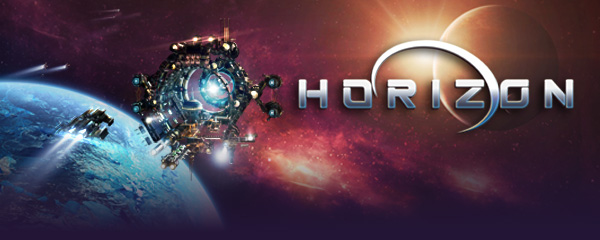
Luke Skywalker, Captain Kirk, and any other space-age wanderers, if you ever wish to truly become a master of space and find a balance of peace and war, you’d be best learning from this newly released game, Horizon.
Horizon is a sci-fi strategy game with the ambitious intention of world expansion and galactic conquest, in which you are given an entire universe to explore at your leisure. The universe, yet unexplored and full of mystery lies in wait for you to uncover its secrets, by exploration and expansion, or by communication and trade, but you are certainly not alone in the darkness, and a variation of races emerge from the shadows as you do. It is your task to colonize this unexplored corner of the galaxy and make as much profit as you can, whether this be through the industry of your planet or the destruction of your enemies is entirely up to you.
At first glance, Horizon throws too much at you at once. Its as if they threw an entire spaceship at you, and all you have to catch it is tiny, inexperienced human hands. You can’t catch that without preparation! And at the start the game does not help you prepare efficiently. Its tutorial is basic at best, and does not go into the depth fully needed to understand the game’s clever yet complicated game play system.
It’s all well and good to have a nice looking captain pop up and tell me what’s happening in the story, and what might be the best way to go about progressing through it, but when he refuses to explain how to do the seemingly simplest of tasks, such as movement, taking turns, ship design and communication, you are at a loss and incapable of continuing. The tutorial seems to go with the premise that you already know the basics – when, if you’re new to the game, you won’t. And without the basic learning instructions, Horizon at first seems like too much to comprehend, and becomes frustrating.
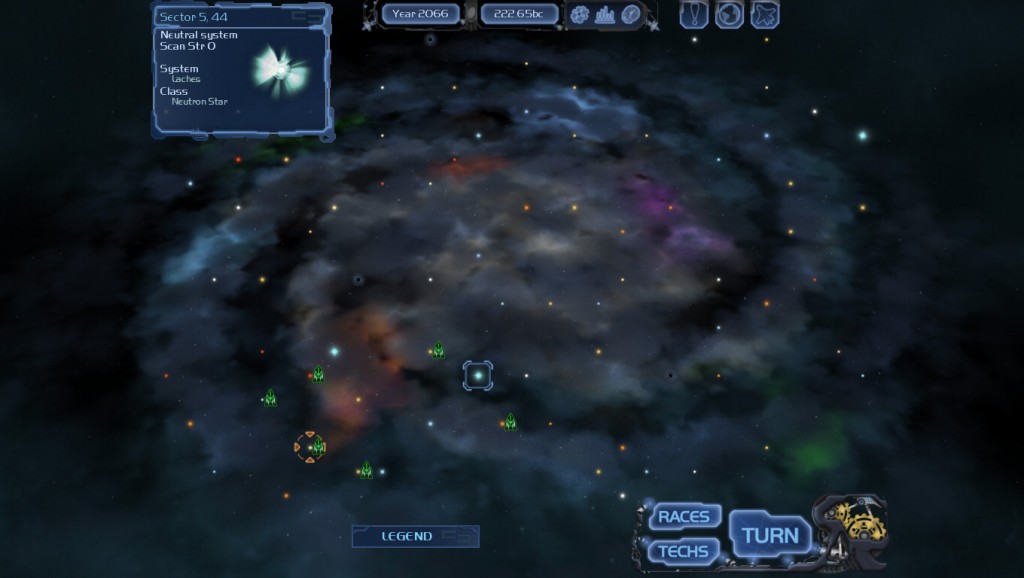
But, eventually, with little nudges here and there and your own intuition, the game play becomes clear, and you won’t need the annoying captain popping up with his unhelpful suggestions. The game basis is a a series of matches that you will design for your own want of game play, being able to choose how many planets in this new-found galaxy, were you to want few opponents or much to explore, and the general size of the zone you must uncover. With this also comes a difficulty balance, so beginners may still play on a level that keeps the game fair. At this, you choose a race to play.
The races in Horizon are original and interesting, ranging from fish people to rock monsters, even parasitic nightmares and crystal beauties. In game, the races are visually pleasing, if a little cartoon like, and each possess their own range of abilities and skills that will aid them in their mission of galactic conquest. There are 11 races in all to play,
The Barbecks – A natural species, looks like a blob, reclusive and one with their own planet, wholly organic and nature aware.
The Barsig – A small gnome like entity, with a low rank in the galaxy and low level technology, yet scavenging brings in the credits where their brains do not.
The Gargals – A fish creature living on an aquatic planet, they have recently discovered space travel and are keen to explore.
The Har’Kan – An unusual ancient species that communicate via a psychic link, making poor communication in space a thing of the past.
The Kamzaks – An entirely matriarchal race, the women of the Kamzaks pride their efficiency and highly ordered society.
The Kortahz – One of the oldest races in the galaxy, they claim to have created life, and seek justification and recognition for doing so.
The Kuntari – An enormous warlord creature, the Kuntari are experts in battle and conquest, and allow no one to stand in their way.
The Lezgoon – Once a friendly and welcoming race, after suffering a planetary incident, they have become solitary and wary of others.
The Tantik – A parasite that sucks the life from its host, and uses their body to gain knowledge and power in the galaxy.
The Varians – Another of the oldest of races, the Varians are a large creature made of molten rock, and are curious to watch the younger races as they grow.
And the Humans – The youngest of all the races and new to space travel, humans wish to colonize new planets to escape their old one.
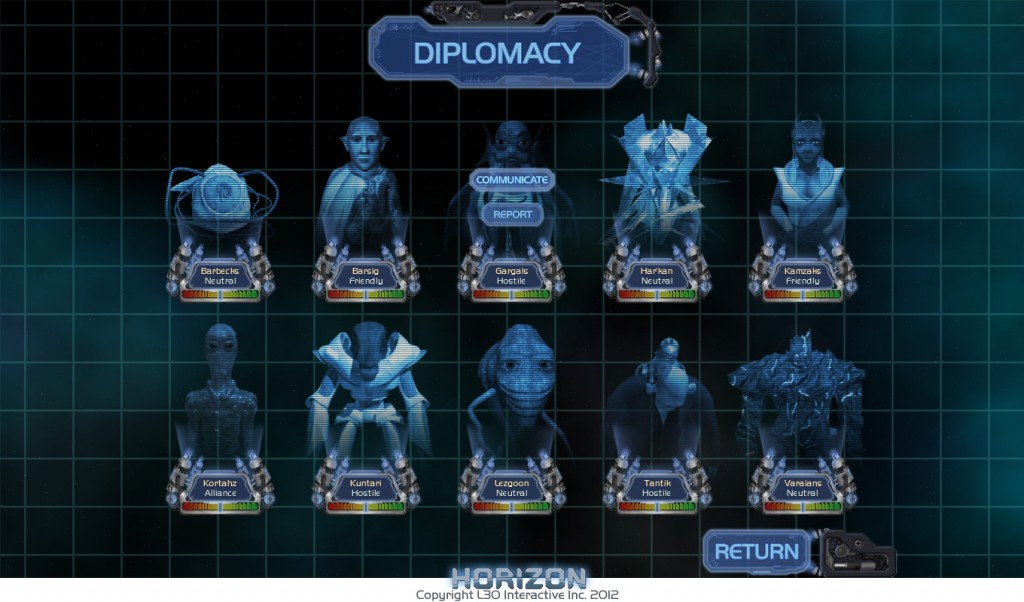
I very much like the races – they aren’t stereotypical or just taken right out of Star Wars, they are the game’s original design and each one is unique and important to the game play system. Choosing a race is an important decision, as it will dictate your method of victory. The game will show you each race’s speciality and their skills, whether it be war, industry, tourism or farming, each one is better than another in certain aspects. This is a nice addition to the game’s system, for race choice can make a different game each time. It’s also quite exciting when you encounter another race whilst exploring the universe, trying to decipher which it might be by the appearance of their ship. You always hope for friendly races – but hopes are not always noted.
Once you’re in the game, there is no real direct story or quest, you must gain victory through conquest or through profit, and how you do this is up to you. In this sense, the starting point of the game is rather dull, as there are few races to deal with or battle, you do not really have enough money to prosper yet, and your planet is still in the struggling stage. It also doesn’t help when one of the first races you encounter are the Tantik, and they destroy the first ship you successfully designed. But that was merely my own experience in two separate games, the Tantik are not always the first encounter.
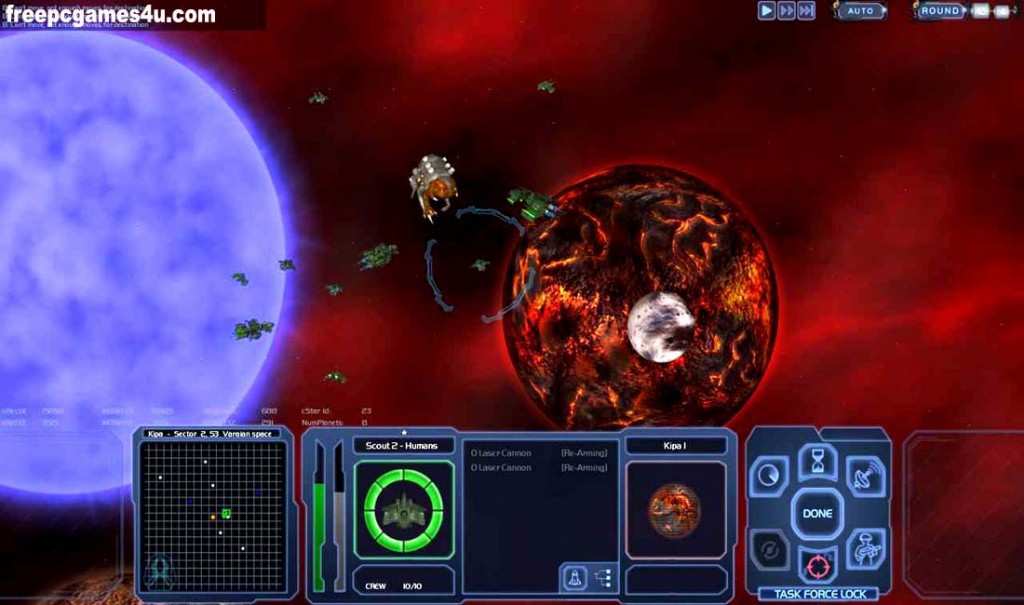
But, slow as the beginning is, the game kicks off about half way into the match when at last, things are looking up, and things start getting exciting. You’ve actually managed to make quite a bit of money, and with it, you can create more ships to explore the universe, or add more into your home planet.
Ship and planet design are a nice little addition. With your space ships, the game allows you to intricately design each aspect of the ship to fit your individual need, for example, if you want a battle ship for warfare, you would remove any supply space or barracks, and simply load the ship up with lasers and missiles – or if you were off on a colonizing mission, you would create a large ship, capable of carrying your population, with room for supply and the technology to survey a planet before taking it. The ship design can only handle a certain amount of additions, you are given 100 points to spend, with lasers costing around 20 each while barracks cost 50, so wise spending is advised. You can name each ship as you wish, something I quite liked, as it was great fun to see my “X-Wing” ship and my “Tardis” ship flying through space.
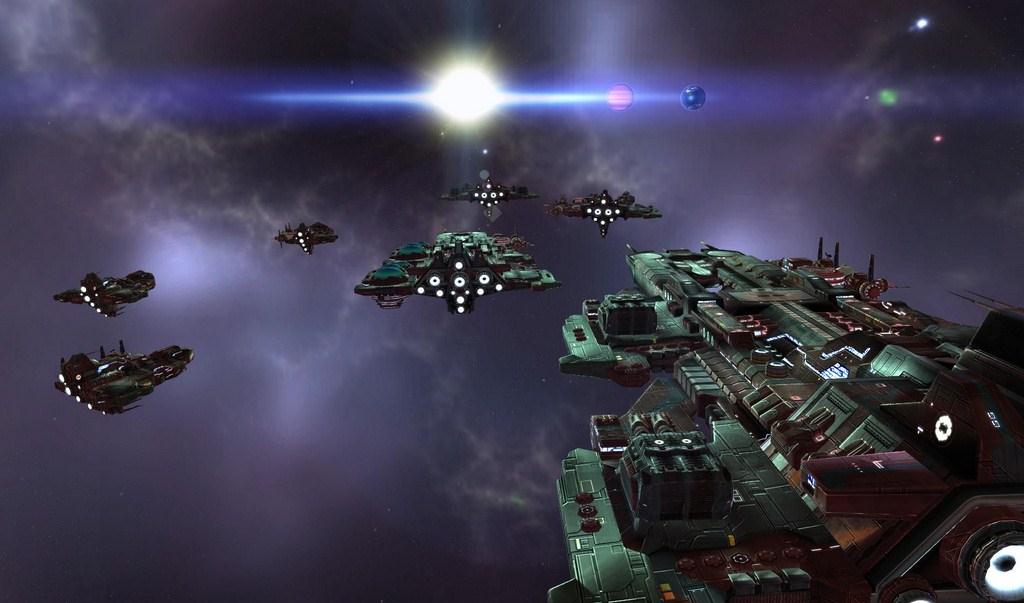
When it comes to planet design, this concerns what your planet does whilst you are away. There are six aspects, farming, industry, entertainment, trade, scientific research, and government – certain planets will be better suited to certain profit methods, for example a planet with a iron core would be prime for mining, and thus your industry has a reliable and frequent source to make money. However if your planet has little resources, it might be better to improve the lifestyles of your people through entertainment and tourism, and rely on trade for your supply. This is yet another fantastic element of the game, getting to personalize and design your own planet to whatever you see fit. You will find yourself getting strangely attached to these planets you have put so much time in. My planets, Westeros and Middle Earth, trade crops and foodstuffs with various races, whilst my Hogwarts planet has had to become a war base, having been recently invaded by those darned Tantik.
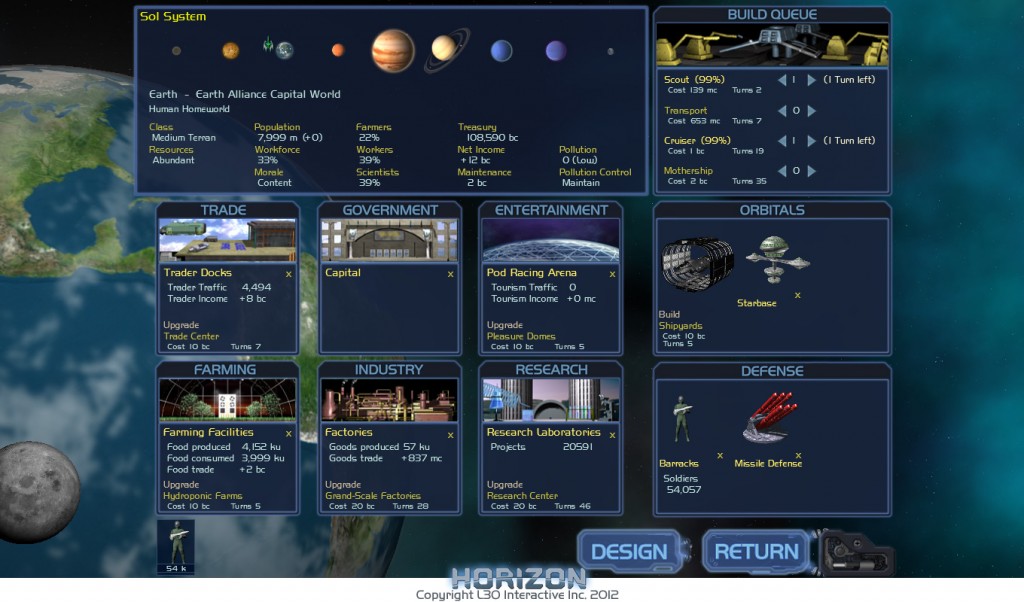
But, there is a small issue in all this, building pod-racing stadiums or factories or research facilities takes time – a lot of time. Time is based in turns in Horizon, and building a farm could take well over 50 turns. That is a lot of time to wait when you need the cash quick. You are allowed to rush construction, so that it only takes 1 or 2 turns, but this can cost an extreme amount of money to do, and the temptation of rushing is too great when faced with waiting 100 turns. You will find yourself extremely poor because of this annoying waiting, and the game would appear much more accessible were it to shorten its waiting periods. I mean I’m all for realism, but should it really take so long!

When you actually do get around to having ships ready to soar, you can send them out into battle. Sadly, the combat in Horizon is rather poor and lacks enjoyment. It contains movement around the space in question, drawing closer to your enemy in order to click on them and shoot – little else. There is no fleeing, so were you to be outnumbered, there is no way of escape, losing is inevitable. The music soundtrack during battle is great and atmospheric, with its booming and tense chorus, but it in no way matches the actuality and simplicity of the combat in game. But, in all fairness to Horizon, it is not a combat-bound game, the speciality is strategy, and that is something they have designed very well. Brains before brawn, Horizon would argue.
The great thing about Horizon is that you can always come back to a match, whenever you feel the need. The match is saved as you last left it, so were you to start a new game, wanting to explore another race or different strategy method, your previous game will always be there waiting for you should your new game not go as planned. You could well have 11 matches saved, one to try playing as each race available. I found this very useful, as I was able to create new matches and test certain strategy plans, to see if they worked and whether or not I should use them in my main match.
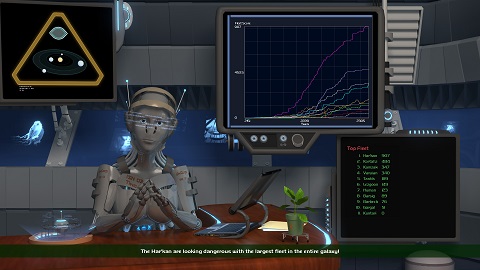
Your progress in the game is summarised every now and then in a sort of galactic news report hosted by the lovely robot in the above picture, setting the score in game for each race, and confirming who is in the lead in this race of conquest.
All in all, Horizon is an extremely clever and intelligently designed strategy game, priding some of the most intricate and unique game play systems in a long while. However while it may boast such things, it does not quite reach the potential that it could, and lacks in areas such as combat, visual beauty, and playability. Although great fun and enjoyable in many aspects, certain flaws peek through and can dramatically bother game play.
Horizon –
Rating: 









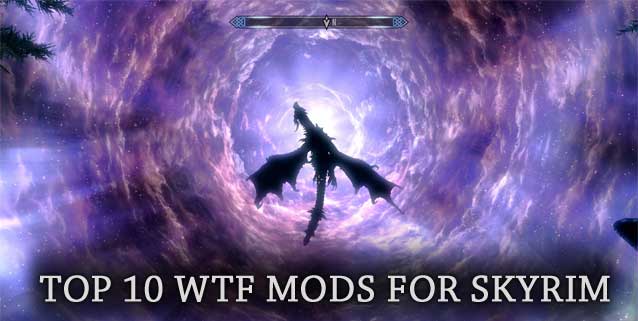

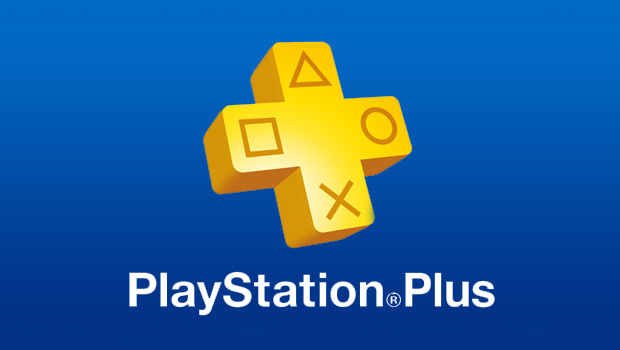

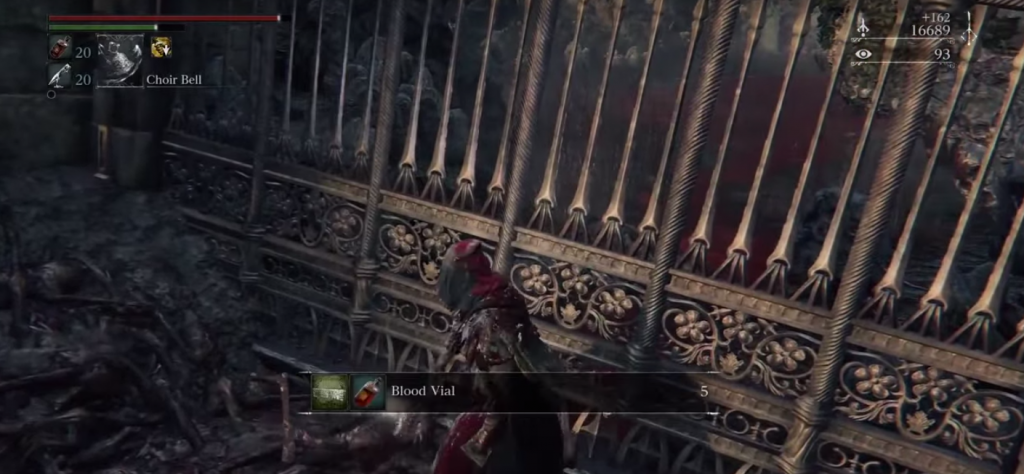 Bloodborne: The Old Hunters – Here's how to farm Blood Vials
Bloodborne: The Old Hunters – Here's how to farm Blood Vials Dark Souls 2 Enemies Guide - Part 3
Dark Souls 2 Enemies Guide - Part 3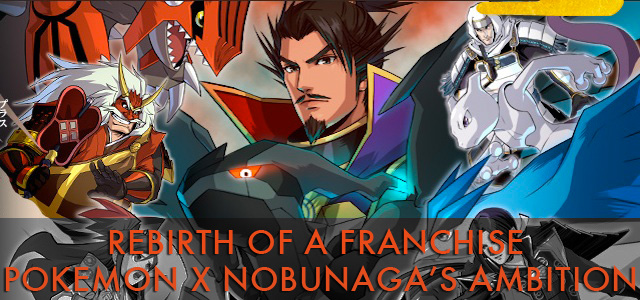 Rebirth of a Franchise: Pokémon x Nobunagas Ambition
Rebirth of a Franchise: Pokémon x Nobunagas Ambition Alien Isolation Wiki – Everything you need to know about the game .
Alien Isolation Wiki – Everything you need to know about the game . Super Karoshi Walkthrough
Super Karoshi Walkthrough